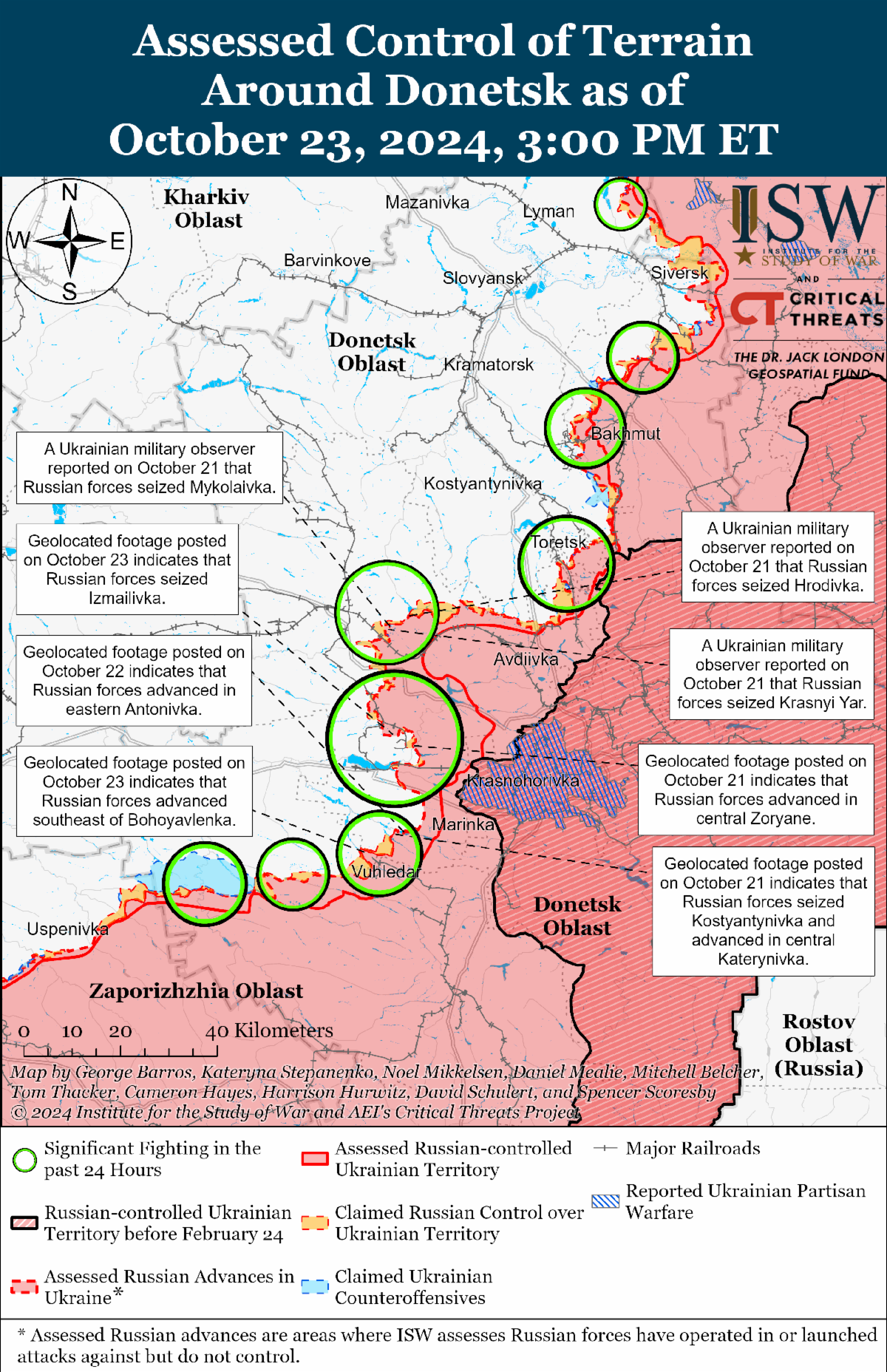The adoption of the Kazan Declaration on the second day of the BRICS summit in Kazan, Republic of Tatarstan on October 23 demonstrated that Russia has not yet secured the international support nor created the alternative security structure that the Kremlin desires. The Kazan Declaration notably only mentioned Russia's war in Ukraine once. The declaration states that all signatories should act in accordance with the principles of the UN Charter — including the provision on respect for territorial integrity — and that BRICS states welcome "relevant" offers of mediation aimed at ensuring a peaceful settlement of the war through dialogue and diplomacy. Ukraine has emphasized that the "principles of the UN Charter" is a main avenue through which Ukraine can achieve peace and highlighted the illegality of Russia's war under international law. The Ukrainian Ministry of Foreign Affairs (MFA) responded to the Kazan Declaration, stating that it shows that Russia failed to "export" its views on changing the world order and global security architecture to BRICS summit participant states. The Ukrainian MFA stated that the declaration also demonstrates that BRICS states are not unified around Russia's war against Ukraine, likely since many of these countries support the UN Charter's principles. Ukraine's Foreign Intelligence Service similarly assessed that the BRICS summit will not result in the international community's approval of an alternative system of international settlements that Russia wants and stated that India, the United Arab Emirates (UAE), Brazil, and South Africa opposed the transformation of BRICS into an anti-US coalition.
People’s Republic of China (PRC) President Xi Jinping reiterated the PRC’s longstanding position calling for de-escalation in Russia’s war in Ukraine and discouraged the involvement of third parties in the war amid reports of Russia preparing to deploy North Korean troops to Ukraine. Xi emphasized the need to promote “a rapid de-escalation" of Russia’s war in Ukraine and avoid “adding fuel to the fire” during the 16th annual BRICS summit in Kazan on October 23. Xi also stated that BRICS members must prevent the spreading of the war to “third parties” and avoid the escalation of hostilities. Xi stated that the PRC, Brazil and countries of the Global South created a group of “Friends of Peace,” which aims to unite voices in support of a peaceful resolution of Russia’s war in Ukraine. Xi had previously called for de-escalation of the war and attempted to position the PRC as an impartial third-party mediator for a negotiated peace settlement between Russia and Ukraine. Russia has been increasingly leveraging partnerships with North Korea and Iran, and Ukrainian President Volodymyr Zelensky has accused Russia of directly involving North Korea in the war amid reports of North Korean combat forces training in Russia for possible participation in the war.
Iranian President Masoud Pezeshkian reiterated Iran’s intentions to increase ties with Russia and the People’s Republic of China (PRC) at the BRICS Summit in Kazan, Russia, on October 23. NOTE: This text also appears in ISW-CTP's October 23 Iran Update. Pezeshkian met with Russian President Vladimir Putin to discuss Russo-Iranian economic and strategic relations on the sidelines of the summit. Pezeshkian stated that the two officials will finalize and sign memorandums soon, suggesting that both states will sign the new comprehensive strategic partnership agreement. Putin authorized the signing of the deal on September 18. It is in Iran’s interests to have a formalized agreement with Russia. Iran presumably will seek greater international support as Israel’s ground and air offensives on the Gaza Strip and Lebanon have disrupted some elements of Iran’s proxy network. This disruption is particularly notable given that Hezbollah’s capabilities — which now appear degraded by Israeli action at a minimum — have long served as Iran’s principal deterrence against Israeli attack. Russia has discouraged Israeli attack on nuclear facilities, demonstrating the advantages of strong Iranian relations with Russia. The Pezeshkian administration’s policy continues former President Ebrahim Raisi’s "neighborhood policy.” This policy is centered on building relations with regional and extra-regional states, thus demonstrating the administration’s efforts to mitigate the impact of international sanctions and bolster the Iranian economy. The Iranian regime calculates that mitigating the impact of sanctions increases domestic stability and regime credibility. Russo-Iranian cooperation has accelerated since the start of Russia’s offensive campaign in Ukraine due to Iran’s military support in the war.
Key Takeaways:
- The adoption of the Kazan Declaration on the second day of the BRICS summit in Kazan, Republic of Tatarstan on October 23 demonstrated that Russia has not yet secured the international support nor created the alternative security structure that the Kremlin desires.
- People’s Republic of China (PRC) President Xi Jinping reiterated the PRC’s longstanding position calling for de-escalation in Russia’s war in Ukraine and discouraged the involvement of third parties in the war amid reports of Russia preparing to deploy North Korean troops to Ukraine.
- Iranian President Masoud Pezeshkian reiterated Iran’s intentions to increase ties with Russia and the People’s Republic of China (PRC) at the BRICS Summit in Kazan, Russia, on October 23.
- Russian forces have made significant tactical advances into and around Selydove in recent days, but the Russian military command's apparent focus on securing Selydove has come at the expense of Russian forces' ability to sustain a meaningful offensive drive directly on Pokrovsk — Russia's self-defined operational objective on this sector of the front.
- The Pentagon and White House confirmed the deployment of North Korean troops to Russia.
- Russia and Belarus announced plans to conduct the “Zapad-2025” command staff exercise on an unspecified date in 2025 against the backdrop of deepening Russian-Belarusian security integration within the Union State framework.
- Ukrainian and Russian forces recently advanced in Kursk Oblast.
- Russian forces recently advanced near Kupyansk, Pokrovsk, and Vuhledar.
- The Russian military is reportedly coercing Russian conscripts into contract service in the Russian military by issuing enlistment bonuses to conscripts who never signed military service contracts with the Russian Ministry of Defense (MoD).
| 




